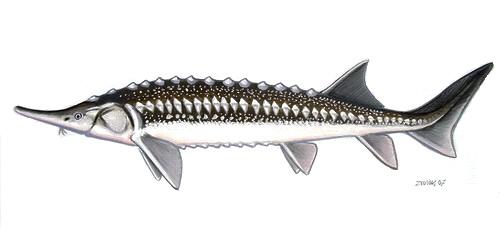here here
Kio estas manĝaĵo? Ion ajn ni manĝas, ĉu ne? Estas ĉiu nutraĵo, kion nia kulturo provizadis al la vivantaj homoj, hejmbestoj, kaj brutaroj kiuj manĝas ĝin. Tio, jes, kaj plia. La bestoj savaĝaj trovas iliajn manĝaĵojn en la naturo sen homaj asistadoj. Ni ankaŭ ĉasas sovaĝajn bestojn kaj fiŝojn por manĝi.
What is food? Anything we eat, right? It's all
the food our culture has provided to living people,
pets and livestock that eat it. That, yes, and more.
The wild animals find their own food in nature
without human help. We also hunt and fish wildlife
to eat.
Jen la sevrugo (stelata sturgo), sovaĝa fiŝo tre serĉata (kaj ĝia kaviaro). Subite ĝi aperas ĉi tie, naĝante tra la mezo de frazo. Tre antikvaj homoj unue trovis ĉi tiun fiŝon vespere, kiam ĝi leviĝis de fundo ĝis la surfaco de riveroj.
Behold, the Starry Sturgeon, a wild fish much
sought after (and its caviar). It suddenly appears here,
swimming up through the middle of a sentence.
Early humans would first find these fish at dusk,
when they would rise to the surface.
O here here how hoth sprowled
met the duskt the father of
fornicationists but,
(O my shining stars and body!)
Jen, esperante.
Ho, jen, ĉi tie, iel etendite
trafis la vesperon la patro
de malĉastadistoj sed,
(Aj, miaj brilantaj steloj kaj korpo!)
Joseph Cambell diras la “patro de malĉastistoj” reprezentas tre prahomon. Aŭ kion mi provas indiki en Esperanto kiel “malproksima”, tial la ambigua vorto, ĉu mal’ĉasta’dist’oj aŭ mal’ĉast’ad’ist’oj.
Joseph Campbell says the "father of fornicationists"
represents primordial man. So, I try to indicate
in Esperanto "distant", hence the ambiguous word,
read either as mal'ĉasta'dist'oj or mal'ĉast'ad'ist'oj.
referencoj/references
-
Joyce, James, “Finnegans Wake”, 1939, p. 4. http://finwake.com/01/01.htm#4 ↩
-
Joyce, James, “Finnegans Wake”, 1939, p. 4. http://www.finnegansweb.com/wiki/index.php/Page_4 ↩
-
Campbell, “Skeleton Key” p. 33. ↩
